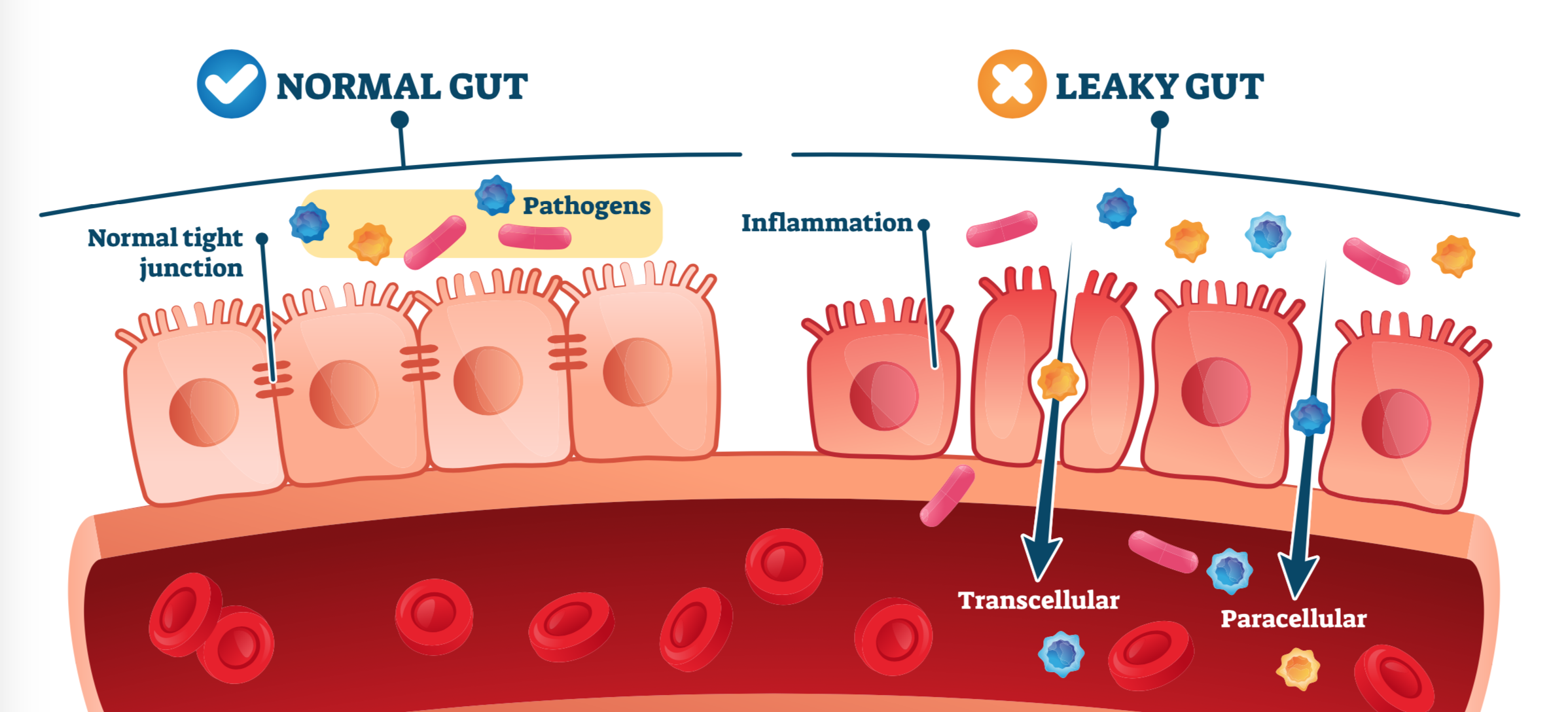Leaky Gut is Not a Fad Phrase
It is a physiological consequence of poor diet, stress, trauma, and/or some medications.
The importance of the role the intestinal barrier plays in health and disease cannot be overstated. What goes on in our gut has a profound affect on every function of our body from energy production, neurological communications, immune system defense, cellular processes, organ homeostasis, musculo-skeletal health to disease prevention. The digestive tract is our first line of defense to outside threats to our health, accounting for nearly 80% of our immune system. It is critical that the integrity of this barrier is maintained to ensure optimal health.
The intestinal barrier is a complex system. On the one hand, an intact intestinal barrier protects the body against invasion of pathogens and toxins; on the other hand, this barrier must remain open to absorb essential nutrients and fluids. The surface of the lining is covered with a protective mucus. The intestinal mucosa has adapted to allow friendly microorganisms to co-exist without creating an inflammatory response, while providing a controlled defensive response to perceived pathogens. The physical barrier of the intestines consists of the vascular endothelium (tissue lining that has an abundant blood supply), the thin epithelium cell lining with its brush boarder and tight protein junctions, and the mucus layer. It is an expansive organ. The surface area of the small intestine is nearly as large as a tennis court, approximately 2,400 square feet, due to millions of villi, finger-like projections, and the whole of the intestine amounts to approximately 40% of the body’s energy expenditure.
In a healthy gut barrier these endothelial cells line up next to each other with tight junctions to prevent the passage of molecules between the cells. Nutrients must be broken down into small enough particles to pass through the membranes of these cells to enter into the blood stream and lymphatic system. This passage through the cell is called trans cellular, and is the healthy pathway for molecules to cross over into the bloodstream. The mucus plays a key role in keeping intestinal microbes at a distance from the epithelial surface. As long as the integrity of this mucosal layer, brush boarder and endothelial cells remain intact, the small intestine is successful in defending our body.
Problems arise when the integrity of the intestine lining becomes compromised. Loss of intestinal barrier function can occur abruptly, for example following a major trauma or surgery, or gradually leading to chronic inflammatory diseases. The variety of contributors to this gradual barrier and microbiome disruption include:
· Stress
· Malnutrition
· Low stomach acid
· Illness
· Environmental contaminants and toxins
· Gastrointestinal disease
· Immune system overload
· Excessive consumption of alcohol
· Long-term use of NSAIDS
· Poor food choices
· Inflammation
· Presence of pathogenic bacteria, parasites, and yeasts
These can erode the mucosal layer, damage and break down the brush boarder, and cause inflammation and decay of the endothelial cells. When the boarder of the intestine is inflamed these tight junctions loosen up and allow larger molecules, pathogens, and toxins to pass between the junctions and directly into the blood stream without the benefit of being processed in the cytoplasm of the endothelial cells to render them harmless.
These larger molecules, antigens, pathogens are perceived by the immune system as invaders, and antibodies are produced in response to defend the body against these invaders causing inflammation, oxidation, and damage far from the intestines, for example in the joints and/or brain. The beauty, and curse, of the immune system is its memory for invaders. While this is critical for a quick response to repeat pathogen invasion, it wreaks havoc with commonly ingested foods. Once the body has become “sensitized” to a particular food, every time it is detected, an immune response is activated and the battle cascade and its byproducts will flood the body, leaving the person with symptoms of digestive distress, lack of energy, chronic inflammation, and can lead to more serious health problems. Inflammation of the brush boarder can prevent nutrients from being absorbed and used, creating a malnourished body less able to respond to these mounting pathogens and allergens, exacerbating the problem.
The infant’s gut is particularly sensitive to exposure due to the naturally loose junctions of the intestine epithelial cells. These loose junctions are necessary for the passage of large immunoglobulin molecules from their mother’s breast milk. These immunoglobulins are critical for providing the foundation for the immune system in infants to build their defense system.
There is much we can do to soothe, support, and restore our intestine barrier integrity. Lifestyle changes, removing the trigger foods from our diet, integrating the right nutrients into our diets, and supplementing with key herbs and supplements are among the supportive measures we can take to ensure a healthier digestive system. Download this free PDF for actions you can take to support your intestinal barrier.
